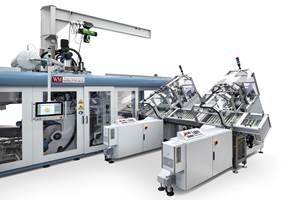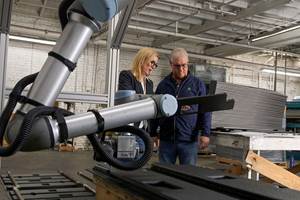Cooling Makeover Helps Plant Boost Efficiency, Save Energy
Switch to new system also allows extruder and thermoformer to boost throughputs.
Royal Interpack Group’s success in food packaging is rooted in innovation. And the same thinking is applied to all aspects of its extrusion and thermoforming processes. That includes the decision to adopt an advanced process-cooling method at its first plant in North America in an effort to boost efficiency and lower energy costs. Royal Interpack is headquartered in Thailand and produces clamshell containers and a variety of other packages, primarily for food.
In 2012, it formed Royal Interpack North America Inc. and opened its first plant on this continent, a 150,000 ft2 facility in Riverside, Calif. Soon thereafter, the firm implemented a strategy to gradually upgrade its process-cooling technology. With an eye toward optimal control of water temperatures and flows, it set out to find a cooling system that would allow it to achieve three things:
-
Effortlessly match water tempera- ture and flow to the characteristics of any given process and product.
-
Increase throughput of sheet, made from a range of materials and subsequently thermoformed.
-
Reduce the amount of energy con- sumed in extrusion and thermoforming processes, consistent with Royal Interpack’s commitment to sustainability.
Initially, air-cooled chillers served as the only process-cooling source in the plant, dictating a complete overhaul of the cooling system. Royal Interpack partnered with Italy’s Frigel (U.S. operation Frigel North America, Inc.) to come up with a system aligned with its goals.
Frigel began with an extensive analysis of the extrusion and forming processes and associated cooling temperatures and requirements. From there it designed and implemented an integrated cooling system that eliminated the air-cooled chillers altogether. The new system features components tailored to each process:
Extrusion: Each sheet extrusion line uses one dual-zone Microgel RCD and one single-zone Microgel RCM unit; both are chiller/temperature-control unit (TCU) combinations. Positioned next to each line to cool the roll stack, the Microgel units supply the precise temperatures, turbulent water flow, and pressure needed for each production run.
Thermoforming: Each of the 11 thermoforming lines uses a single-zone Microgel unit to deliver the same level of control as that achieved on the extrusion lines.
Plantwide: Three closed-loop Ecodry central coolers deliver process-cooling water to the machine-side Microgel units used in both processes. Frigel monitors each microprocessor-controlled Ecodry unit to ensure optimal efficiency and ease of routine maintenance.
According to Kunal Sidhpura, COO of Royal Interpack North America Inc., the Frigel system provides control over process cooling—including temperatures and flows—where none existed before. As a result, he says, the processor has been able to leverage the full capacity of its extruders by boosting throughput by as much as 15%. Machine-side control also eliminated the need to use a heat exchanger to reheat chilled water supplied previously by an air- cooled chiller.
Moreover, Royal Interpack now consistently delivers process-cooling water to the thermoforming lines at the temperatures, flows, and pressures needed, says Sidhpura. This means there is no wasted energy, since air-cooled chillers often provide no temperature control and only supply water at one temperature and flow rate. The new system achieves even more energy savings because it uses ambient air to cool process water to save energy via “free cooling,” which means there is no need for chillers to meet cooling loads when ambient conditions permit, Sidhpura points out.
Royal Interpack opened a second North American plant last year, a 40,000 ft2 facility in Anderson, Ind.
Related Content
Amcor, Berry Merge in All-Stock Deal
Move unites two complementary businesses to create a global leader in consumer packaging.
Read MoreAutomation in Thermoforming on the Rise
Equipment suppliers’ latest innovations exemplify this trend driven by factors such as labor shortages, higher-speed thermoformers and tighter quality control.
Read MoreThermoformed Container Keeps Battery Cells Safe
Despite last-minute design changes and other unexpected roadblocks, thermoformer TriEnda works with a key supplier on innovative reusable shipping container.
Read MoreCobot Creates 'Cell Manufacturing Dream' for Thermoformer
Kal Plastics deploys Universal Robot trimming cobot for a fraction of the cost and lead time of a CNC machine, cuts trimming time nearly in half and reduces late shipments to under 1% — all while improving employee safety and growth opportunities.
Read MoreRead Next
Beyond Prototypes: 8 Ways the Plastics Industry Is Using 3D Printing
Plastics processors are finding applications for 3D printing around the plant and across the supply chain. Here are 8 examples to look for at NPE2024.
Read MoreLead the Conversation, Change the Conversation
Coverage of single-use plastics can be both misleading and demoralizing. Here are 10 tips for changing the perception of the plastics industry at your company and in your community.
Read MoreMaking the Circular Economy a Reality
Driven by brand owner demands and new worldwide legislation, the entire supply chain is working toward the shift to circularity, with some evidence the circular economy has already begun.
Read More


















